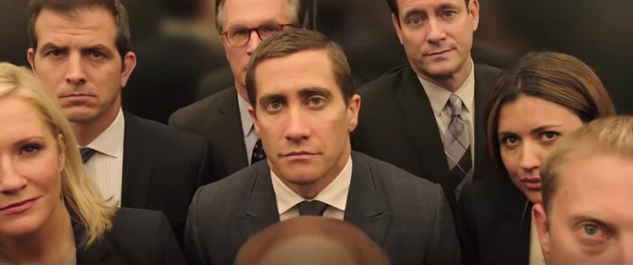“There was love between us. I just didn’t take care of it.” So establishes the crux of Jean-Marc Vallée’s Demolition, with Jake Gyllenhaal in the role of a non-bereaved widower named Davis Mitchell, a man who, incidentally, seems like a more grown up version of Thomas “Holden” Worther in 2002’s The Good Girl. With a similar emotional handicap and equally as macabre thoughts, Davis does not feel the pressure to mourn the death of his wife, Julia (Heather Lind), much to the dismay and discomfiture of her affluent parents, Phil (Chris Cooper) and Margot (Polly Draper). While Phil expects an effusive outpouring on Davis’ part, all he gets are surly responses and strange behaviors, chief among them dismantling just about anything that can be dismantled.
As Davis narrates through his letter-writing (another way in which he mirrors Holden) to the Champion Vending Company about a faulty machine that never gave him his peanut M&Ms at the Saint Andreas Hospital, we discover that this was an annoyance that happened to occur ten minutes after Julia’s death in a car accident that resulted in fatal head trauma. Davis, also in the car, got out “without a scratch.” Convinced that his inability to feel the “appropriate” level of grief means he must not have loved Julia, Davis confesses to a man he occasionally talked with on the train from White Plains to the city that he has no feelings for her or her death. It is at this moment that he also pulls the emergency brake. His brash actions start to worry both his parents and Phil, though, for Phil, it’s more a result of wanting to save face–after all, he employs Davis at his financial firm, what Davis calls “nepotism at its finest.”
As Davis’ letters to the Champion Vending Company become more intense and divulging, customer service finally calls him. Karen Moreno (Naomi Watts), who represents the entire department as the sole employee in the “division,” tells Davis that his letters made her cry and asks if he has anyone to talk to. Soon, we learn that Karen has been following him, a fact Davis uses to his advantage when Karen bails on one of their planned meetings at a diner and watches him eat pancakes from the parking lot, informing him that something about listening to Heart’s “Crazy on You” and just sitting there was making her sad. Soon, Davis becomes obsessed with the song, asking his co-workers in a meeting if they would deem it a melancholy track.
In many ways, Davis’ relationship with Karen reflects that of Holden’s with Justine Last (Jennifer Aniston) in The Good Girl. Like Justine, Karen is an older woman who seems to exude an aura of wisdom and angst that speaks to Davis in magnitudes that can’t be ignored.
In the meantime, he’s begun paying construction workers to let him help perform demolition work on houses. As he rips walls down in an attempt to break apart his own, Davis seems to take comfort in his numbness, a trait that Karen’s son, Chris (Judah Lewis), notices immediately and, in spite of his own impenetrability, appreciates. The two form a bond through their ire and anesthetized state, which leads Chris to confide in Davis that he’s probably gay. Karen, in a constant haze because of her love of what she calls “cannabis” (to make it sound more sophisticated), is unable to see that this is Chris’ true identity.
Fortunately, Davis and Chris manage to come to terms with who they are through each other, with Karen as a sort of guiding muse for both of them along the way. Bryan Sipe’s script, however, makes a strong distinction from Mike White’s in that Karen was never meant to serve as a romantic replacement for Davis the way Justine does for Holden. She is merely a tool on the road to realizing that, yes, he did truly love his wife. And therein marks the transcendence of Thomas Worther into an adult. Named Davis Mitchell.




















